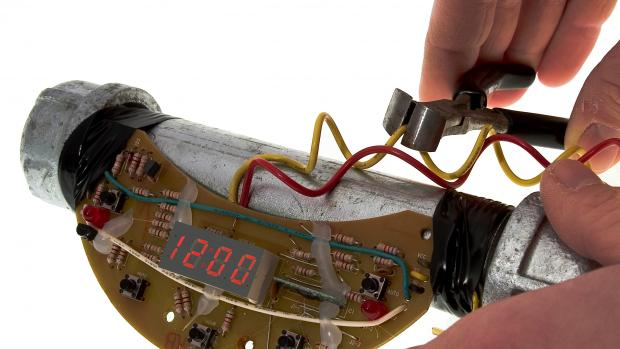NYU-Poly Physicist Collaborates on Detector for Explosives and Chemical Warfare Agents
Scientists Develop Mobile Sensing Units to Find Bombs and Improvised Explosive Devices; Technology Could Replace Current Scanners in Airports

A technology long used for identifying traces of organic compounds in exhaust gases may hold the key to finding minute traces of explosives and chemical warfare agents (CWA) carried into airports or on the clothing of bomb makers, according to an Austrian team of researchers that includes Polytechnic Institute of New York University Physics Professor Kurt Becker.
Dr. Becker is collaborating with researchers at the University of Innsbruck and an Innsbruck-based spin-off company, Ionicon Analytik GmbH, on real-time detection using Proton-Transfer-Reaction Mass Spectrometry (PTR-MS). Laboratory tests showed that PTR-MS can distinguish between substances with very similar molecular structures, and the technology correctly identified explosives, CWAs and chemicals that could be combined to create a bomb.
The scientists at the University of Innsbruck use a plasma to generate protonated water vapor, so named because an extra proton is added to the water. Because most organic compounds – including most explosives and chemical warfare ingredients – have a proton affinity higher than that of protonated water, the proton “jumps” from the protonated water to the target molecule, forming a protonated, positively charged ion. The process preserves the integrity of the target molecule, which can then be uniquely identified by high-resolution mass spectrometry. After the scientists at the University of Innsbruck invented PTR-MS, it was further developed by Ionicon Analytik.
PTR-MS technology has been used for many years to quickly quantify organic compounds in air, industrial exhaust gasses and process gases as well as in food flavor research. PTR-MS instruments can be built for various ranges of sensitivity from parts per billion down to parts per quadrillion. In size and weight, they are comparable to a refrigerator, from compact to full size.
Researchers at Ionicon are working with security agencies in the United Kingdom, France, Germany and Austria to assess the potential of PTR-MS to detect, identify and quantify minute amounts of explosives and CFAs in various environments.
Recent experiments in Innsbruck demonstrated that after handling explosives and CWAs, trace quantities left on a person’s skin, gloves or clothing, as well as in the surrounding air or on surfaces, can still be identified. This led to a beta test of a vehicle-mounted PTR-MS instrument as a means to identify facilities being used for the manufacture of improvised explosive devices (IED).
Key personnel and associates at Ionicon include the original inventors of this technology, Dr, Alfons Jordan and Dr. Armin Hansel, and the mass spectrometry expert Prof. Tilmann Märk who is also vice rector for research at the University of Innsbruck. Dr. Becker has been a visiting professor at the University of Innsbruck for 20 years. This research has been supported by the Austrian science foundation as well as by European Union research funding and by the European defense agency.
About Polytechnic Institute of New York University
Polytechnic Institute of New York University (formerly Polytechnic University), an affiliate of New York University, is a comprehensive school of engineering, applied sciences, technology and research, and is rooted in Polytechnic’s 156-year tradition of invention, innovation and entrepreneurship – i2e.
The institution, founded in 1854, is one of the nation’s oldest private engineering schools. In addition to its main campus at MetroTech Center in downtown Brooklyn, it offers programs at sites throughout the region and around the globe. NYU-Poly has centers in Long Island, Manhattan and Westchester County; globally, it has programs in Israel, China and will be an integral part of NYU's campus in Abu Dhabi opening in autumn 2010.




